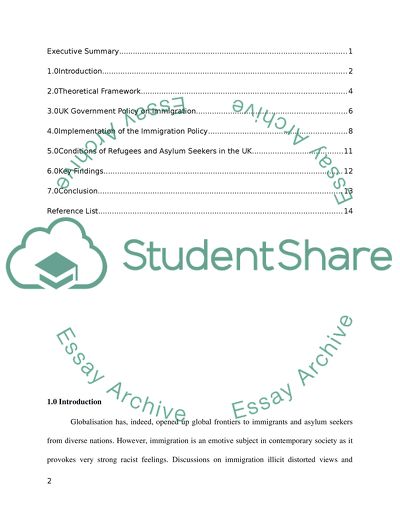Cite this document
(Conditions of Refugees and Asylum Seekers in the UK Case Study - 1, n.d.)
Conditions of Refugees and Asylum Seekers in the UK Case Study - 1. Retrieved from https://studentshare.org/social-science/1633185-critically-evaluate-a-current-uk-government-policy-relating-to-a-social-group-both-of-which-are-impacted-by-globalization-in-your-report-examine-any-practice-issues-arising-from-the-policy-for-members-of-the-social-group
Conditions of Refugees and Asylum Seekers in the UK Case Study - 1. Retrieved from https://studentshare.org/social-science/1633185-critically-evaluate-a-current-uk-government-policy-relating-to-a-social-group-both-of-which-are-impacted-by-globalization-in-your-report-examine-any-practice-issues-arising-from-the-policy-for-members-of-the-social-group
(Conditions of Refugees and Asylum Seekers in the UK Case Study - 1)
Conditions of Refugees and Asylum Seekers in the UK Case Study - 1. https://studentshare.org/social-science/1633185-critically-evaluate-a-current-uk-government-policy-relating-to-a-social-group-both-of-which-are-impacted-by-globalization-in-your-report-examine-any-practice-issues-arising-from-the-policy-for-members-of-the-social-group.
Conditions of Refugees and Asylum Seekers in the UK Case Study - 1. https://studentshare.org/social-science/1633185-critically-evaluate-a-current-uk-government-policy-relating-to-a-social-group-both-of-which-are-impacted-by-globalization-in-your-report-examine-any-practice-issues-arising-from-the-policy-for-members-of-the-social-group.
“Conditions of Refugees and Asylum Seekers in the UK Case Study - 1”, n.d. https://studentshare.org/social-science/1633185-critically-evaluate-a-current-uk-government-policy-relating-to-a-social-group-both-of-which-are-impacted-by-globalization-in-your-report-examine-any-practice-issues-arising-from-the-policy-for-members-of-the-social-group.


